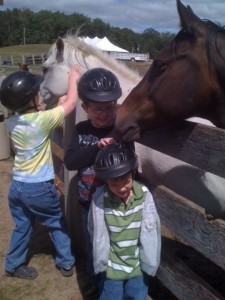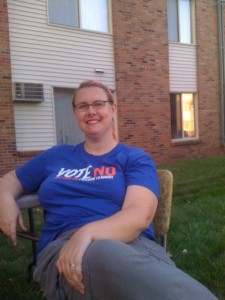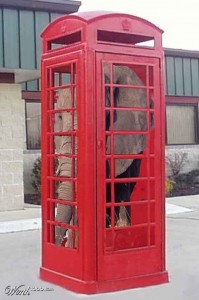 Curriculum & Instruction, Political Science, Psychology, Social Studies
Curriculum & Instruction, Political Science, Psychology, Social Studies  3 Comments
3 Comments Bite Your Tongue
 I’ve been on hiatus here at the blog for a while, as summer (and more specifically, con season) made all our best laid plans gang well and truly a-gley. Having been deprived of Gen Con, I set out to give the boys a few firsts, including first time on a horse and first time in a human-propelled watercraft. They both went surprisingly well.
I’ve been on hiatus here at the blog for a while, as summer (and more specifically, con season) made all our best laid plans gang well and truly a-gley. Having been deprived of Gen Con, I set out to give the boys a few firsts, including first time on a horse and first time in a human-propelled watercraft. They both went surprisingly well.
I’ve also been doing lots of work with Minnesotans United for All Families–not particularly more than before, but the campaign has reached critical mass, and every day it seems there’s movement or news. I had to tell the boys to stop yelling excitedly every time they see an orange “Vote NO” lawn sign, as they started springing up like mushrooms all over Saint Paul, and I began to rapidly lose my hearing. There’s great cause for hope, but it’s going to be close, and we’ll be working flat-out right up to the night of November 6.

(Wo)manning the MN United table at our apartment complex’s National Night Out event. Picture by Griffin.
The heart of my work is having conversations with Minnesota voters, and teaching others to do likewise. It’s so different from other political advocacy I’ve done in the past, as I’ve described previously, and instead of coming home exhausted and drained, it usually takes me an hour or three to come down from the adrenaline high after a phone bank or training. I’ve met fantastic people of every age, faith, place, and life experience, and whatever the outcome of the election, I believe we’re fundamentally changing the way Minnesotans think about each other, about marriage, and about lesbian, gay, bisexual, and transgender people, for the better.
Time and again, though, in my own conversations and the ones I’m training people to have with their friends, family, and neighbors, this question comes up: “What do you say when someone says marriage has always been that way and starts quoting Scripture?” To which I always reply: “You’ve got to bite your tongue, just like I do.”
I know, you’re saying, “You, Jess? You just bite your tongue when it comes to a question of religion and history?” And yes, I really do, hard as that may be for you to picture. In fact, that’s the major skill set I’ve been working on personally in this campaign, and I’ve made real strides in this department.
But why, you ask? Why don’t I lay The Almighty Bible-quoting, chapter-and-verse, dates-and-names-and-edicts-and-Supreme-Court-cases Smackdown To End All Smackdowns on them? I admit, the urge is strong. Sometimes, it feels like a whole segment of the population is just BEGGING me to teach them the history their schools and churches have failed to teach them. It seems like a personal sign from the universe that my particular combination of research is meaningful and needed, right here, right now.
But I’ve discovered something else that’s meaningful and needed, right here, right now: I’m not going to win a single vote for marriage equality by “changing minds,” which is what I’d be trying to do if I gave in to the impulse to lecture. The only way we’re going to defeat this hurtful amendment is to change hearts, and all the knowledge in the world doesn’t even scratch the surface of that mission.
I just finished reading a fascinating book by social psychologist Jonathan Haidt, called The Righteous Mind: Why Good People Are Divided by Politics and Religion. I haven’t felt like assigning required reading to everyone I meet in a while, but if I could buy this book for everyone I know–especially those on the campaign with me–I would. Haidt makes the case for a hybrid definition of how the human mind works, somewhere between Plato’s assertion that emotions are the servants of Reason and Hume’s argument that Reason is a slave to our passions. Haidt says a more apt analogy would be an elephant (our emotions) with a rider (our intellect). The rider can make suggestions to the elephant and looks like he’s in charge, but ultimately, if the elephant decides to head a particular direction, all the rider can do is say “I meant to do him to do that.”
 Haidt also shares the results of his research into the moral foundations on which the edifices of conservative and liberal thought are built, and his conclusion is that part of the success of the modern conservative movement is based on the fact that conservative ideology appeals to a broader array of moral options than liberalism does. Since liberals often think of conservatives as “narrow-minded,” this sounds counter-intuitive, but really, it’s not. Liberals, Haidt demonstrates, derive their moral judgments almost entirely from whether something cares for or harms other beings, or whether it seems equalizing or discriminatory. Conservatives, on the other hand, respond less strongly to equality and care/harm, but additionally respond to messages of proportionality (more/less work=more/less reward), loyalty (to kin and other identity groups), sanctity (upholding standards of purity or pollution), and authority (respect for institutions), while many liberals actually perceive a threat from high degrees of those sources of morality. I think he’s really on to something, and I agree with what I heard Howard Dean talk about in a speech at Penn State, all the way back in 2004–that progressives won’t be able to accomplish their goals until they learn to articulate the morality of their position from all of these angles, and tap into the emotional heart of their message.
Haidt also shares the results of his research into the moral foundations on which the edifices of conservative and liberal thought are built, and his conclusion is that part of the success of the modern conservative movement is based on the fact that conservative ideology appeals to a broader array of moral options than liberalism does. Since liberals often think of conservatives as “narrow-minded,” this sounds counter-intuitive, but really, it’s not. Liberals, Haidt demonstrates, derive their moral judgments almost entirely from whether something cares for or harms other beings, or whether it seems equalizing or discriminatory. Conservatives, on the other hand, respond less strongly to equality and care/harm, but additionally respond to messages of proportionality (more/less work=more/less reward), loyalty (to kin and other identity groups), sanctity (upholding standards of purity or pollution), and authority (respect for institutions), while many liberals actually perceive a threat from high degrees of those sources of morality. I think he’s really on to something, and I agree with what I heard Howard Dean talk about in a speech at Penn State, all the way back in 2004–that progressives won’t be able to accomplish their goals until they learn to articulate the morality of their position from all of these angles, and tap into the emotional heart of their message.
So when I talk to people about the anti-marriage amendment, I’m consciously talking to the elephant, not the rider, because it’s the elephant that will check a box on the ballot November 6. What does that mean, practically? It means I ask voters how they feel about love, marriage, and commitment, not how they think. I ask them if they’re married, if they’ve ever been in love, if they’ve ever been to a wedding, and how those things felt. I ask them whether they know any gay people, and how they feel about them if they do. If they say they don’t, I ask if they’ve ever felt excluded from something they wanted with all their hearts. And I don’t take no for an answer, because that experience is just as universal as love.
What I’m specifically not asking about is what they’ve been taught, what they’ve learned, what they know about the law and history of marriage. I’m not informing them on marriage’s roots in civil, economic, contractual law. I’m not engaging in Dueling Scripture Quotations. I’m not expounding on the long, twisted history of suppression of rights for groups that aren’t rich, white, male, or Christian. I’m not doing any of that, because it’s an absolute waste of my time, and I don’t have a minute to waste between now and the vote. There’s no point in convincing the rider, because there’s no way he can convince that elephant to squeeze into the booth if the elephant’s not into it.
 The way we’re going to win is make the elephant want to get into the booth, and the only way to do that is to tie marriage equality to something the elephant already feels strongly about. Everybody wants love; nobody wants to be told they’re not good enough; we feel strongly about commitments to the people in our lives. Occasionally, I’ll come across a person whose church is democracy, whose scripture is the constitution, and for them, talking about rights and fairness is as persuasive as showing them how this amendment harms the people they love. But that feeling isn’t nearly as universal as the desire for love and the dream of celebrating that love in the sight of family, friends, community, and (for many) their god(s).
The way we’re going to win is make the elephant want to get into the booth, and the only way to do that is to tie marriage equality to something the elephant already feels strongly about. Everybody wants love; nobody wants to be told they’re not good enough; we feel strongly about commitments to the people in our lives. Occasionally, I’ll come across a person whose church is democracy, whose scripture is the constitution, and for them, talking about rights and fairness is as persuasive as showing them how this amendment harms the people they love. But that feeling isn’t nearly as universal as the desire for love and the dream of celebrating that love in the sight of family, friends, community, and (for many) their god(s).
So I bite my tongue, and the teacher in my head jumps up and down furiously at being stifled. But the blood I taste is worth the stories I hear, the hopes and fears people share, and the wonder of creating a connection where there wasn’t one before. Those are the things that will get the elephant in the booth, and help generations of Minnesotans know that they are welcome, valued, and loved in this beautiful state of ours.
This is so thoughtful and so wise and brings up so many feelings for me. I was recently front and center on this same issue– as a writer, not an activist–and found myself in the odd position of having a disagreement with the people I was generally allied with– some individuals on the gay rights side. I was just not willing to condemn or insult every afraid Christian out there or every angry, concerned, confused mom or dad right now because, in my mind, most of them could still be brought to the side of compassion. It was this giant sticking point for some people. They didn’t want compassion and they didn’t want tolerance. They just wanted their rights and to be left alone. And I understood what THEY meant, too. I really did. They’re NOT wrong. And yet…it just felt like it wouldn’t make any difference.
I didn’t–and don’t–think that God-fearing mom and dad would be swayed by my excellent argument or by my liberal point of view, however dear to me. I know that often their hearts do get swayed by the love they have for their sons and daughters and co-workers and friends, and that it doesn’t always come in the form of a concession that gayness is as good as being straight (much as I see it that way), but first as a simple desire that a loved one no longer hurt, that they be allowed in where they were left out in the cold. That impetus to love has to come before any logic can penetrate. Besides, their logic and mine…the two ain’t the same.
So, I, too, find that I bite my tongue and I look for common commitment in the love people express for Christ and what he taught. What would Christ want for his gay sons and daughters? What would Christ do for the least of these? I am learning to speak a language that is not my own in service of what I care about. When I do that, an unexpected joy is the common ground I find with people with whom I thought I might find none.
Beautiful post..as always.
Thanks so much for your kind words, as always. The common language and ground you speak to has been the most rewarding thing for me in this campaign. I had a girly little scream-fest about how awesome marriage is with a 69-yr-old woman celebrating her 50th anniversary this year. She maintained she didn’t know any gay people, and neither did her kids or grandkids. I wanted to scream that she really, really did, but I kept my cool, and asked her about her marriage, and her wedding day, and we sighed and agreed. Then I asked her how she would’ve felt if someone had told her she couldn’t marry her husband because she wasn’t good enough. She gasped as if shot, and said, “Why, I would feel horrible!” I said I agreed, that it just breaks my heart to even imagine. And then I said that that was what this amendment was saying to every same-sex couple who just wants to marry the love of their life.
She’d never, ever thought of it that way, and I think she’ll come around to vote against this amendment, because fear of rejection is as universal as love is. I didn’t have to shout at her, or question her beliefs or her life or her values. And I honestly don’t think a discussion of fairness or equality would’ve done so much. But I *know* she really felt that moment of shock and loss, and, to be honest, regret.
Everyone is at a different point in their journey, and that’s not wrong or bad–that’s just the product of the particular experience each person has had. It’s an incredible privilege when I get to travel even a short distance on that journey with a complete stranger, but just couldn’t happen if I weren’t willing to start where they are.
Brilliant messages and information in this post. I will never know if I have compassion because I’ve spent a lifetime just being who I am, in the x percent of people who don’t fall in love with someone of the opposite sex, or if I would have been compassionate and deeply compelled to be kind to others if I hadn’t grown up in world that made it clear that I was different, when different was most definitely not a fun thing to be. But I don’t really care what would have been. I only have this life I have to love, to laugh, to encourage, to learn, to teach, to build, to help, to bridge, to share, to lift, to work with, to support, to pick up, to work out, to make happy, to be happy, to make beautiful, to protect, to point out, to express ideas, to listen, to curate, to make a difference, to touch a heart, to touch many hearts, to help learn, to walk our dog, to visit a friend, to swim, to experience joy, to share joy, to think about things big and small, to learn to be wise, to smell the roses. (I could go on and on with the long list that your blog has inspired. Most pointedly, it elegantly an simply makes me feel. Thank you for your contribution, you dropped a pebble into the lake of life and your ripples have touched me on this far distant shore. Andy